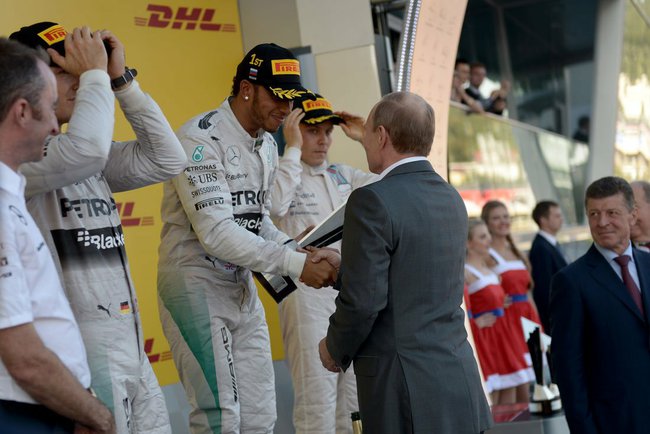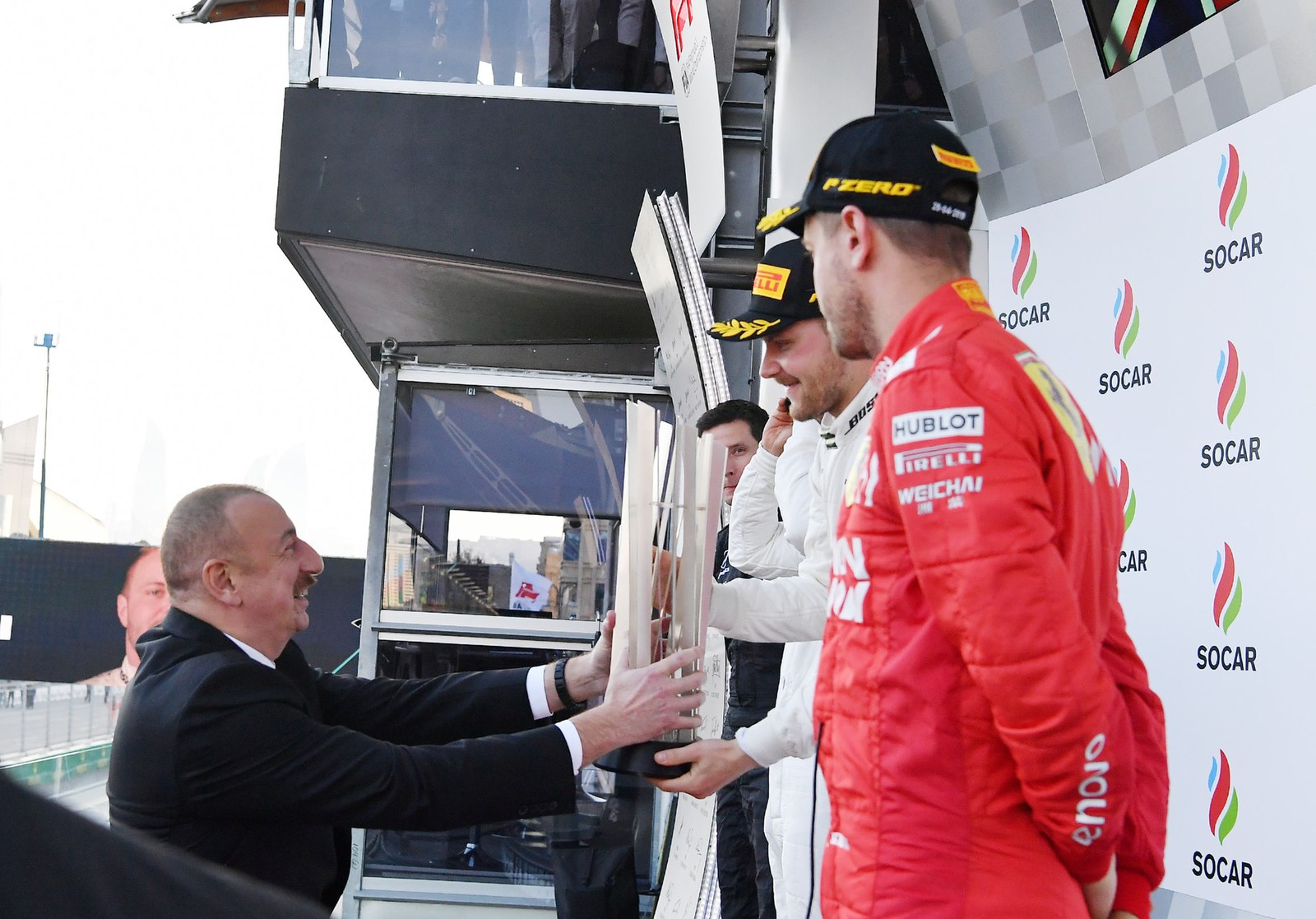F1 – Money Above Morals?

Image: kremlin.ru via Wikimedia Commons.
Will Usherwood-Bliss comments on Formula 1’s complicity in helping nations with poor human rights records improve their reputation through ‘sportswashing’.
What a season. Not since 2012 have we experienced a Formula 1 season with this much intensity, off-track drama and unexpected results. Regardless of your opinion on what unfolded in Abu Dhabi, Max Verstappen is now the first Dutch Formula 1 World Champion after overtaking Lewis Hamilton on the last lap of the final race of the season. The entire event was a spectacle to fans and non-fans alike, two drivers going head to head on equal points, with both teams pulling out every strategy they had to secure the Drivers World Championship.
The same can be said for Qatar and Saudi Arabia, the previous two Grand Prix’s, where you could feel the adrenaline of these high octane races from the comfort of your sofa. The Triple Header in the Desert provided some amazing content for the world of F1, but there lies the issue. Although we now reflect on these races as the climax of an incredible sporting season, it’s easy to forget the controversial venues of these events.
‘Sportswashing’ is nothing new in the sporting world. A nation in need of global appeal to take away from its political ongoings will contact a sports league to host an event there – Qatar 2022, for instance, a World Cup that has already raised lots of criticism.
Any sports league doing this is questionable, but with Formula 1, it is nothing but an anticipated disappointment.
F1 – perhaps more than any other sport – has a reputation of following the money: Australia 2020, for instance, McLaren pulls out of the event due to COVID 19, F1 refuse to cancel until drivers leave of their own accord, Hamilton coins the famous phrase “Cash is King”. Those three words pretty much sum up F1’s approach to money: pay drivers like Mazepin or even Lauda, clearly corrupt teams like Andrea Moda, holding events in questionable venues due to large cash injections.
Look up ‘Las Vegas GP’ for the latter point to find out more, or if you want an hour’s entertainment.
However, perhaps the sport was about to change by introducing a brand new initiative: ‘We Race as One’. Intending to raise awareness surrounding minority groups and human rights, teams painted rainbows on their cars, drivers knelt before the race, and F1’s own publicity pushed this as their new major campaign: the drive for equality.
Surely after this hugely publicised campaign, Formula 1 would finally put their foot in the ground: no more sportswashing.
Not long after the We Race as One initiative was announced, Formula 1 revealed the Saudi Arabia GP.
As you can imagine, the F1 community ridiculed the irony of the situation. For months, the top Instagram comment on anything involving the event was ‘It’s rights out and away we go’ or other similar puns. Leaving memes to one side, it is a very fair point: Saudi Arabia’s government has a shocking record regarding human rights. A 2020 Amnesty International Human Rights report found several issues with their policies: silencing activists via prison sentences with unfair trials, silencing critics online via the use of ‘Anti-Cyber Crime’ laws, imprisonment of LGBTQ+ individuals, death sentences being handed out during unfair trials, as well as abstaining from the UN vote on the Universals Declaration of Human Rights, to name but a few.
F1 CEO Chase Carey’s case for putting on the race wasn’t exactly aided by announcing the track layout of the Jeddah Street Circuit. Described by Red Bull’s Sergio Perez as “too dangerous without a real reason,” the 3.836-mile long circuit does not give drivers a second to catch their breath or put a foot wrong. Imagine the tightness of Monaco and the speeds of Monza, zero room for error, dangerous overtaking when it is possible, and a lack of runoff during highspeed corners such as Turn 22.
Yes, the track did, in the end, provide an exciting spectacle; but purely from a racing fan’s perspective, was that due to the track action? No, it was entirely down to the unsafe layout of the track, causing drama at the end of a championship battle. Take that away, and you’ve got Monaco without any history or safety features.
The combination of an unsafe track layout which wasn’t even ready on the first day of the weekend, boring racing aside from crashing due to said layout, in a nation whose government has consistent human rights violations, says a lot about the current state of the sport. But really, it shouldn’t come as a shock.

Image: The Presidential Press and Information Office’s of Azerbaijan via Wikimedia Commons.
For too many years now, F1 has followed the money to race in questionable venues. The Azerbaijan GP is often a calendar favourite for the modern F1 fan, yet we gloss over their current political ongoings due to its excitement. The Abu Dhabi GP is an amazing spectacle for the fans in a beautiful venue, with improved racing due to the new layout. Yet, the UAE’s controversial human rights records also get shoved under the rug. Moving out of the Middle East, the Hungarian GP this year was overshadowed by the implementation of a new law banning the promotion of LGBTQ+ representation in schools, a move publicly opposed by both Vettel and Hamilton, albeit they still took part in that weekend.
That moves us on to a final reflection: do drivers have a moral responsibility not to participate in these events? Some may argue that boycotting should be the first order of priority, especially given F1 has now become the fastest-growing sport on the planet. The weight these drivers carry on their shoulders, as with all athletes, when it comes to public relations is monumental: they’re role models, activists, and icons in popular culture. For them to boycott races would be a huge display of power and would certainly send the message to Formula 1 bosses.
However, can we really expect them to? Take the season just gone: for Hamilton and Verstappen and drivers lower down the grid, every point counted. To boycott the second to last race of the season would have been detrimental to their chances of winning the championship. Albeit from the comfort of our couches and phones, it is easy to spam comment sections with calls for boycotting; for the drivers, it is their life and their career.
In this writer’s opinion, there is a fine line in the world of sports. There is, of course, the desire to make money and expand your international output, yet there is also the moral responsibility of the sport’s organisers. F1 cannot claim to push the boundaries of inclusion within the sport if it takes its yearly fixtures to nations whose governments go against these principles. If governments look to attract sports like Formula 1 to ‘sportswash’ their current climates, then it should be the responsibility of the sport’s governing bodies to put their foot in the ground. Yes, the money may be high, but is that worth losing your fans and sporting morals for? A question new CEO Domenicali may want to consider.
On a final note, to all Formula One fans: we also have a responsibility to draw a line. In recent years, there has been a lot of private Middle Eastern investment in teams and races, but it is important to separate the people of a nation from its government. Although I disagree with these races being held in these venues, racism directed towards individuals and companies based on where they come from, such as new FIA President Muhammed Ben Sulayem who received hideous comments on social media when he was elected at the end of the season, is vile and has no place in the sport.


